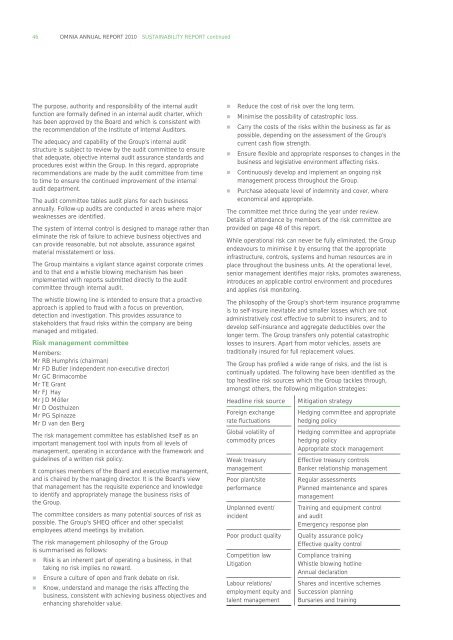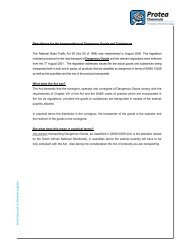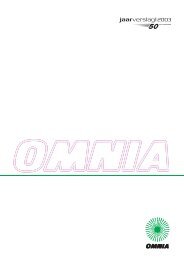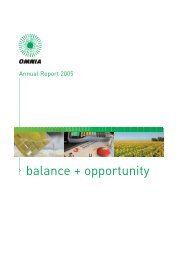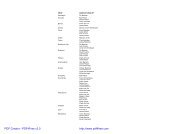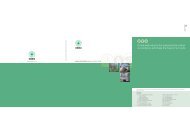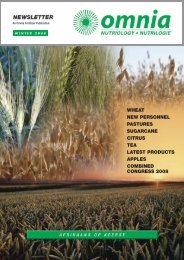omnia holdings annual report 2010 omnia holdings annu
omnia holdings annual report 2010 omnia holdings annu
omnia holdings annual report 2010 omnia holdings annu
Create successful ePaper yourself
Turn your PDF publications into a flip-book with our unique Google optimized e-Paper software.
46 OMNIA ANNUAL REPORT <strong>2010</strong> SUSTAINABILITY REPORT continued<br />
The purpose, authority and responsibility of the internal audit<br />
function are formally defined in an internal audit charter, which<br />
has been approved by the Board and which is consistent with<br />
the recommendation of the Institute of Internal Auditors.<br />
The adequacy and capability of the Group’s internal audit<br />
structure is subject to review by the audit committee to ensure<br />
that adequate, objective internal audit assurance standards and<br />
procedures exist within the Group. In this regard, appropriate<br />
recommendations are made by the audit committee from time<br />
to time to ensure the continued improvement of the internal<br />
audit department.<br />
The audit committee tables audit plans for each business<br />
<strong><strong>annu</strong>al</strong>ly. Follow-up audits are conducted in areas where major<br />
weaknesses are identified.<br />
The system of internal control is designed to manage rather than<br />
eliminate the risk of failure to achieve business objectives and<br />
can provide reasonable, but not absolute, assurance against<br />
material misstatement or loss.<br />
The Group maintains a vigilant stance against corporate crimes<br />
and to that end a whistle blowing mechanism has been<br />
implemented with <strong>report</strong>s submitted directly to the audit<br />
committee through internal audit.<br />
The whistle blowing line is intended to ensure that a proactive<br />
approach is applied to fraud with a focus on prevention,<br />
detection and investigation. This provides assurance to<br />
stakeholders that fraud risks within the company are being<br />
managed and mitigated.<br />
Risk management committee<br />
Members:<br />
Mr RB Humphris (chairman)<br />
Mr FD Butler (independent non-executive director)<br />
Mr GC Brimacombe<br />
Mr TE Grant<br />
Mr FJ Hay<br />
Mr JD Möller<br />
Mr D Oosthuizen<br />
Mr PG Spinazze<br />
Mr D van den Berg<br />
The risk management committee has established itself as an<br />
important management tool with inputs from all levels of<br />
management, operating in accordance with the framework and<br />
guidelines of a written risk policy.<br />
It comprises members of the Board and executive management,<br />
and is chaired by the managing director. It is the Board’s view<br />
that management has the requisite experience and knowledge<br />
to identify and appropriately manage the business risks of<br />
the Group.<br />
The committee considers as many potential sources of risk as<br />
possible. The Group’s SHEQ officer and other specialist<br />
employees attend meetings by invitation.<br />
The risk management philosophy of the Group<br />
is summarised as follows:<br />
� Risk is an inherent part of operating a business, in that<br />
taking no risk implies no reward.<br />
� Ensure a culture of open and frank debate on risk.<br />
� Know, understand and manage the risks affecting the<br />
business, consistent with achieving business objectives and<br />
enhancing shareholder value.<br />
� Reduce the cost of risk over the long term.<br />
� Minimise the possibility of catastrophic loss.<br />
� Carry the costs of the risks within the business as far as<br />
possible, depending on the assessment of the Group’s<br />
current cash flow strength.<br />
� Ensure flexible and appropriate responses to changes in the<br />
business and legislative environment affecting risks.<br />
� Continuously develop and implement an ongoing risk<br />
management process throughout the Group.<br />
� Purchase adequate level of indemnity and cover, where<br />
economical and appropriate.<br />
The committee met thrice during the year under review.<br />
Details of attendance by members of the risk committee are<br />
provided on page 48 of this <strong>report</strong>.<br />
While operational risk can never be fully eliminated, the Group<br />
endeavours to minimise it by ensuring that the appropriate<br />
infrastructure, controls, systems and human resources are in<br />
place throughout the business units. At the operational level,<br />
senior management identifies major risks, promotes awareness,<br />
introduces an applicable control environment and procedures<br />
and applies risk monitoring.<br />
The philosophy of the Group’s short-term insurance programme<br />
is to self-insure inevitable and smaller losses which are not<br />
administratively cost effective to submit to insurers, and to<br />
develop self-insurance and aggregate deductibles over the<br />
longer term. The Group transfers only potential catastrophic<br />
losses to insurers. Apart from motor vehicles, assets are<br />
traditionally insured for full replacement values.<br />
The Group has profiled a wide range of risks, and the list is<br />
continually updated. The following have been identified as the<br />
top headline risk sources which the Group tackles through,<br />
amongst others, the following mitigation strategies:<br />
Headline risk source Mitigation strategy<br />
Foreign exchange<br />
rate fluctuations<br />
Global volatility of<br />
commodity prices<br />
Weak treasury<br />
management<br />
Poor plant/site<br />
performance<br />
Unplanned event/<br />
incident<br />
Hedging committee and appropriate<br />
hedging policy<br />
Hedging committee and appropriate<br />
hedging policy<br />
Appropriate stock management<br />
Effective treasury controls<br />
Banker relationship management<br />
Regular assessments<br />
Planned maintenance and spares<br />
management<br />
Training and equipment control<br />
and audit<br />
Emergency response plan<br />
Poor product quality Quality assurance policy<br />
Effective quality control<br />
Competition law<br />
Litigation<br />
Labour relations/<br />
employment equity and<br />
talent management<br />
Compliance training<br />
Whistle blowing hotline<br />
Annual declaration<br />
Shares and incentive schemes<br />
Succession planning<br />
Bursaries and training


